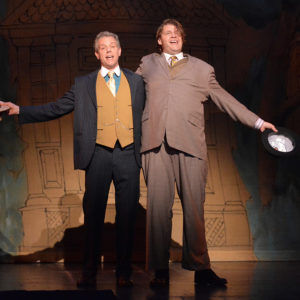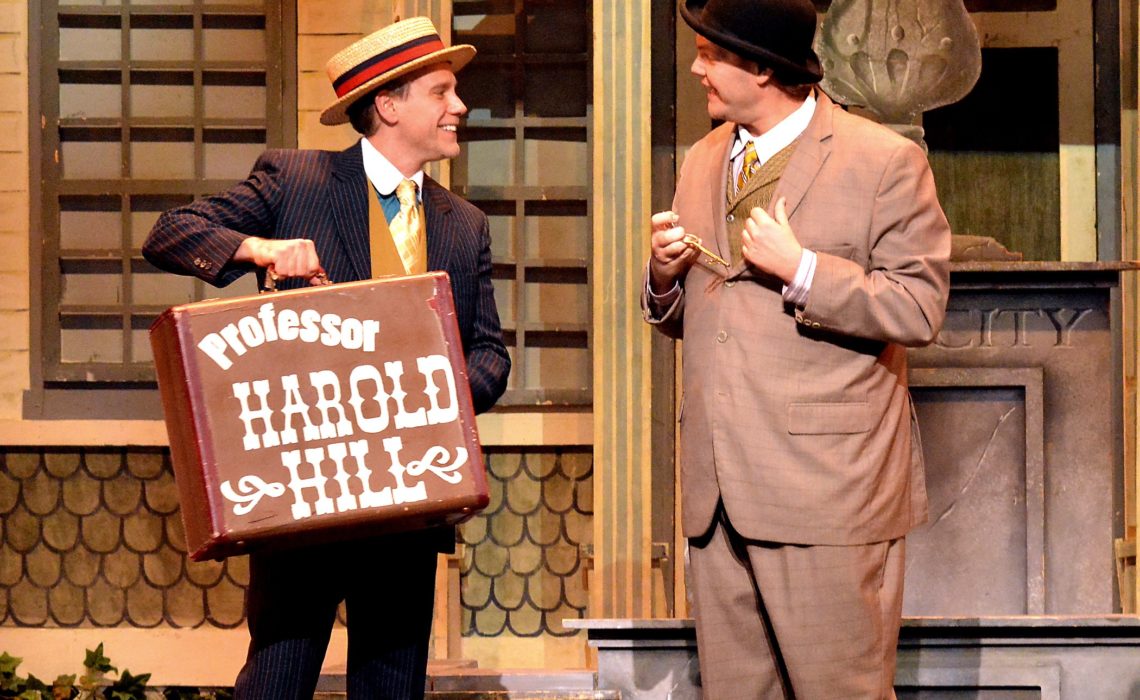Every so often an actor emerges who is what I call a “five-tool-player,” a term borrowed from baseball, describing someone who can run, hit, field, throw, and hit for power. In the theater, this means someone who can act, sing, dance, and is skilled at comedy as well as drama. That description fits Trent Mills, who at 30, appears to be able to do it all. When an actor can show his personality even through the garish makeup and rubbery Shrek costume, you know he’s good. That’s when we first saw Mills, who starred in the stage adaptation of the Disney film for 5-Star Theatricals earlier this year. This month, Mills is playing Marcellus Washburn, former sidekick of slick traveling salesman Harold Hill in 5-Star’s production of The Music Man. And despite the tendency to do an impression of Buddy Hackett, Mills puts his own stamp on the part and does it with skill, realism, and likability. We talked with Trent recently and got to know a little about his background and his approach to the role.
VCOS: Your bio in the Music Man program says that you are a self-described comedy nerd. Explain.
TRENT: (laughs) Yes, well, I’ve done improv since I was about 16 and was obsessed with that and have always been enthused by it but never made any money doing it. So I just call myself a nerd (laughs).
VCOS: What’s your day job?
TRENT: I do a lot of things because I’m very flexible. A couple times a week I work at a warehouse refurbishing furniture, which is what I’m doing today. But I also work at a non-profit called 24th Street Theatre in downtown L.A. They bus in kids from all over L.A. County and we teach them about theatre and put on a show for them. It helps fill in the gaps when things are not as abundant as you’d like them to be.
VCOS: Where did you get your education?
TRENT: I went to the Boston Conservatory of Music where I graduated in 2011 with a bachelor’s in fine arts and musical theatre.
VCOS: Any favorite performers that you’ve idolized over the years?
TRENT: Absolutely. I grew up obsessed with Chris Farley and Will Ferrell, Ferrell during his time with SNL and Farley during his years with David Spade. And then, as far as the musical theater world goes, I absolutely adore Christopher Seiber. Seiber was in Spamalot, he was the original Farquaad in Shrek, he played Miss Trunchball in Matilda on Broadway, and is just a spectacular character actor who is just constantly working and is very transformative. My goal has always been to be as pliable as I can be as an actor.
VCOS: Did you have a mentor?
TRENT: I’m grateful enough to have quite a few mentors. Patrick Cassidy has become quite a mentor for me, and he’s been the biggest one lately. But then I have a mentor who is not in theater, a good friend who is an art history professor who kind of guides me through the other stuff in life.
VCOS: I see by your credits that you’ve done drama as well as comedy, in shows like One Flew Over the Cuckoo’s Nest. Do you use a different set of creative muscles when you move from drama to comedy and back or are you able to mix them up?
TRENT: I think it’s always been in my nature try to find the funny in anything, but I certainly adore doing dramatic work, to be honest, I absolutely love it. But I’ve found that when people find out that you can be funny, it tends to be a little bit more lucrative. It’s a little easier to get hired when you’re good at comedy.
VCOS: Is comedy harder, as they say?
TRENT: I think comedy is something that you’re more born with. I think drama is something that is more of a learned skill, but it’s harder to teach someone to be funny. For me, I was just kind of a funny-looking guy and it was a skill that I just had to have. So it’s not hard for me because I know what I think is funny, which is sometimes out of line with what other people think is funny (laughs).
VCOS: Well, I think you have the physicality necessary to play comedy and play it well.
TRENT: Yeah, and I worked hard at it! One of the things that always inspired me about Chris Farley was that he was not only incredibly funny as an actor but he was also physically funny. If you watch something like “Lunch Lady Land” on SNL, you see him executing these pretty accurate ballet moves because he actually took ballet, and he took it seriously. I think he knew he could make it funny. So, physical comedians in general are people who really made me try to do my best in my work, and being as precise and as funny as I could.
VCOS: I’ve seen that in your appearances in Shrek and now The Music Man. I also noticed that in spite of your size, you are pretty limber and funny at the same time.
TRENT: Thank you. I learned a lot of that when I was in Boston from Tommy Dara. He actually passed away a couple of years ago, but he was one of the most brilliant physical comedians and actors you ever saw. He could have taken the world by storm, but he decided to live in Boston and I got to work under him for a couple of years. He taught me some very specific things about comedy and it’s hard work, especially when you want to be precise in a certain era of comedy relating to older shows. Comedy is a serious business.
VCOS: I always enjoyed watching Jackie Gleason and how well he could move despite being a large man.
TRENT: Oh, my gosh. Absolutely! You can tell he knew what he was doing and worked overtime physically.
VCOS: It really would have helped to have grown up during vaudeville, wouldn’t it?
TRENT: Yeah, I guess the closest thing you have to that today if you want to move into TV and film is getting experience in theater. In theater, you have to have a bigger and broader style. When I toured in Evil Dead: The Musical, that’s an incredibly physical show, and you don’t do that just once, you do it eight times a week. So I’m incredibly grateful for that and have had to figure out how to do things safely with precision, but also how to replicate physical and vocal comedy over and over again and make it appear fresh. That was the best training I ever had, even more than school.
VCOS: Playing Marcellus Washburn in The Music Man seems to be an ideal move for you. How did you get that part?
TRENT: You know, I wasn’t even thinking about Marcellus when I went to audition for the show. I had spoken with Patrick and initially I wasn’t going to come in, but he said why don’t you come in for Tenor 1 in the quartet, because since I came to L.A. I’ve sung a lot more than anything else and I have a reputation for having a higher tenor. So I said great, and I came in and that’s what I was gunning for and Marcellus wasn’t even in the conversation. Then when I left the room after the audition, they called me back in and asked me if I could do Marcellus and it totally made sense. I was excited to do something different with the role. A lot of people tend to discount that role and think of it as a throwaway, so I really wanted to bring some modern humor to the character, more grounded realness.
VCOS: Give me an example.
TRENT: Well, this guy was a con man. A lot of people miss that part when they play this role. They play him like he’s some kind of a bumbling, silly guy. And he’s even written that way, a silly man who will just do anything for Harold. But really, what he is is a reformed con man who is not unlike Harold Hill himself. He might not be as smooth with the ladies, but I like to think of Marcellus as a guy who is on the run and is hiding out in River City. He probably got into some pretty heavy trouble in Chicago or something, jumped a train and tried to find his way into a small town where he couldn’t be found. Frankly, I think he’s bored to death in River City. Here he is, this outsider, in this little Iowa town, and you can hear it in the way he talks about the people in the town, you know, he tells Harold, “you’ll never get anywhere with these stubborn Iowans.” He clearly hates living there. And then he says he’s met this “nice, comfortable girl,” Ethel Toffelmier, which to me doesn’t strike me as love. He just found somebody that he could hide behind.
VCOS: I always thought that Buddy Hackett was miscast in that role, a fish out of water with his Brooklyn accent.
TRENT: Yes! (laughs) Absolutely. Buddy Hackett played it as Buddy Hackett playing Marcellus. And that’s what I keep in mind when I watch him play it in the movie.
VCOS: Your Marcellus seems a little slicker than that.
TRENT: Yeah, he’s slicker, I think he knows all the things that Harold knows. In my mind, when they worked together, Marcellus was more the muscle and Harold was the ladies man.
VCOS: When you do “The Sadder-But-Wiser-Girl” with Adam Pascal, it’s Harold’s song, but you almost steal it from him with your reactions and the bits of business that you put into it. When you do something like that, where you’re the secondary character, is there something that tells you that you should hold back and try not upstage the other actor? Or do you feel like you’re enhancing the song with your mugging?

TRENT: I think in that particular case a lot of it is Peggy Hickey’s choreography. She gave me a lot of license to do whatever I wanted, but a lot of it is her vision, which is almost like Harold using Marcellus as his puppet to make his point. It definitely was not written this way, but in our production, I think what it does is solidify his role as Harold’s wing man, that sensibility that Marcellus has. To me, the point of that song, with Marcellus doing those outlandish, silly things, is really defining that relationship. I’m his devoted right-hand man.
VCOS: It’s almost like it’s a duet, but you’re the silent one in the duet.
TRENT: Ha, ha, ha! You’re not wrong! Yeah, it’s kind of fun, and you don’t see that kind of thing very often.
VCOS: Are you comfortable as a dancer? Because this is a dance-intensive show.
TRENT: I took a lot of dance and trained as a dancer at Boston Conservatory. They make everybody dance there. It doesn’t matter if you’re a character actor or whatever you do. You get there and you have at least three years of tap, ballet, jazz, modern. And I took some dance in high school as well when I was younger. So I have a lot of the fundamentals. I specifically took more to ballet than anything else. But honestly, I use it more in physical comedy than in actual outright dancing. So this was the first time that I was able to actually get to dance in a few years.
VCOS: You do a lot of acrobatics in there as well. Did you get much of that in school, too?
TRENT: Yeah, I get to do some cartwheels in the show; I forced my way into cartwheeling because the girl who plays Ethel, Dani Gonzalez, can also do some of that, and we’re both a little bit bigger people so we thought it might be kind of funny to pull that out. I always love doing that kind of work because it’s surprising to people who don’t know me that I can actually be pretty acrobatic. I’m 6′ 4″ and about 250, depending on whether it’s a good day or bad day. In Evil Dead: The Musical, I would do front flips, fight my own hand, and jump around, and that in itself was kind of a boot camp for me. So that really empowered me into knowing what I can do physically. Shows like The Music Man are great because I can show off those kinds of skill sets. I don’t get to do much of that, especially since I moved to L.A. where I’ve fallen into more of the singer category for a lot of things.
VCOS: Do you prefer character roles or do you see yourself in leading parts?
TRENT: Leading parts, but there are just not a lot of them for people like me, but I’m certainly more comfortable leading shows. And I’m so grateful when I get to play these character roles, the sidekick. It’s super fun because the pressure is off (laughs) – for me, that is.
VCOS: I can see you as Javert some day.
TRENT: Yeah, but I’m looking more at doing Jean Valjean, I don’t think I could sing Javert’s low notes.
VCOS: Last question. At the end of The Music Man Harold marries Marian and Marcellus is still with Ethel. Where do you see Harold and Marcellus in five years? Are they still in River City?
TRENT: Oh, here’s where it gets dark for my vision of Marcellus. (laughs) In our production, you’ll notice that Marcellus is not in the final number. He’s not in the final scene. I think Marcellus has skipped town, because, if you’ll notice, at the end – and they don’t address this – Marcellus is clearly aiding and abetting Harold Hill, and the sheriff comes and sees him, and it’s very clear that Marcellus is intertwined in this, and then, suddenly, he’s not in the next scene. Very early on, I realized that, hey, Marcellus left town. I don’t think he knows that Harold is going to get away with it, but I think Marcellus has gone back to Chicago. In my version, I think that’s where he’s from. Or else he’s moved on to another small town. I think Marcellus got spooked, jumped off the foot bridge, and made a run for it. (laughs)
VCOS: What an idea for a sequel, huh?
TRENT: Right! I think it’s interesting! Or a prequel! I’d love to know how he got there in the first place.
VCOS: What would you call a musical starring Marcellus Washburn?
TRENT: I’d call it “Marcy.”
VCOS: Or “The Return of Shipoopi.”
TRENT: Ahhh, ha, ha, ha, ha! I love that!
*******************
The Music Man plays through October 27 at the Kavli Theatre in Thousand Oaks, For dates and showtimes, see the VC On Stage Calendar.






No Comments